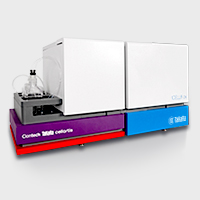Basic cell preparation for the ICELL8 cx system
This protocol applies to standard tissue culture cells, grown in suspension using standard media and culture vessels. These cells can be cultured to a high density and are easy to harvest by centrifugation. Typical examples of these types of cells include Jurkat and K562 cells.
Downstream ICELL8 cx applications for this protocol include SMART-Seq, 3' DE, and custom chemistries.
A. Collect cells
- Remove the tissue culture vessel from the incubator and transfer to a standard sterile tissue culture hood.
- Create an even cell suspension by carefully swirling the culture vessel.
- Remove the cap or lid from the tissue culture vessel and use a 10-ml serological pipette to gently mix the cell suspension, so as to avoid damaging the cells.
- After proper mixing, collect 3-4 ml of the cell suspension and transfer into a new 5-ml tube.
B. Count cells
- Determine the cell concentration in the collected cell suspension, using your preferred method.
-
Calculate the number of cells/ml and transfer a volume of cell suspension containing 250,000 cells into a fresh 5-ml tube.
NOTE: The minimum cell suspension volume to be transferred should be 1 ml. If the concentration of the cell suspension is greater than 250,000 cells/ml, dilute the suspension down to 250,000 cells/ml before transferring 1 ml to a fresh 5-ml tube. If the concentration of the cell suspension is considerably lower than 250,000 cell/ml, you might need to transfer a volume of more than 2.5 ml into a new fresh tube to transfer 250,000 cells. If this is the case, we recommend transferring the cell suspension into a 15-ml conical tube instead of a 5-ml tube.
C. Label cells
NOTE: We recommend using Invitrogen ReadyProbes Cell Viability Imaging Kit, Red/Blue which contains both Hoechst 33342 and propidium iodide (Thermo Fisher Scientific; Cat. # R37610).
In order to detect dispensed cells in the ICELL8 chips, it is necessary to label all cells twice: once with an indiscriminant stain and then again with a viability stain to discriminate between live and dead cells. Hoechst 33342 is cell permeable and binds to dsDNA in live cells regardless of membrane status. Propidium iodide (PI) will permanently bind to DNA in dead or apoptotic cells with compromised membranes.
Dispensed double-labeled cells can be identified in the chip as:
- Hoechst positive only: live cells
- Hoechst and PI positive: dead cells
- PI positive only: debris
-
Depending on the cell suspension volume (see Section B, Step 2), appropriate volumes of Hoechst and PI dyes will need to be added. Please follow the Hoechst 33342 dye and PI dye volume recommendations listed in the table below to ensure that a correct volume of each is being used. Add the appropriate volumes of Hoechst 33342 and PI dyes to the tube containing the cell suspension.
Cell suspension volume (ml) PI volume (μl) Hoechst 33342 volume (μl) 1 80 80 2 160 160 3 240 240 4 320 320 5 400 400 -
Once both dyes have been added, mix cells by slowly pipetting up and down with either a wide-orifice pipette tip or a serological pipette.
IMPORTANT: Do NOT vortex the cell suspension to mix the dyes.
-
Incubate cells with the dyes at 37°C for 20 min.
D. Prepare labeled cells for dispense
-
Dilute the labeled cell suspension by adding an equal volume of cold 1X PBS (without calcium or magnesium) and mix cells by slowly pipetting up and down with either a wide-orifice pipette tip or a serological pipette.
IMPORTANT: Do NOT vortex the cell suspension.
-
Pellet the cells by centrifugation at 4°C.
NOTE: Optimal centrifugation speed and time may vary depending on the cell type. We have validated this protocol with the following guidelines:
Cells ≥13 μm: 100g for 3 min
Cells ≤12 μm: 500g for 3 min - Gently remove the tube from the centrifuge without disturbing the cell pellet, and use a wide-orifice pipette tip or a serological pipette to carefully aspirate the supernatant without disturbing the cell pellet.
- Using a wide-orifice pipette tip, gently add 1 ml of iced 1X PBS to the tube side wall.
-
Using the same tip, gently mix the cell suspension by slowly pipetting up and down ~5 times.
IMPORTANT: Do NOT vortex to resuspend the pellet.
-
Determine the cell concentration in the cell suspension.
IMPORTANT: The recommended concentration range for the stained cell suspension before dispense is 1.2–2.5 x 105 cells/ml. If the concentration is lower than 1.2 x 105 cells/ml, re-pellet the stained cell suspension and resuspend in a lower volume of 1X PBS to achieve a concentration in the recommended range.
- Place the tube containing the cell suspension within the recommended concentration range directly on ice.
The cell suspension is now ready for ICELL8 cx applications such as SMART-seq, 3' DE, or custom chemistries.
Takara Bio USA, Inc.
United States/Canada: +1.800.662.2566 • Asia Pacific: +1.650.919.7300 • Europe: +33.(0)1.3904.6880 • Japan: +81.(0)77.565.6999
FOR RESEARCH USE ONLY. NOT FOR USE IN DIAGNOSTIC PROCEDURES. © 2025 Takara Bio Inc. All Rights Reserved. All trademarks are the property of Takara Bio Inc. or its affiliate(s) in the U.S. and/or other countries or their respective owners. Certain trademarks may not be registered in all jurisdictions. Additional product, intellectual property, and restricted use information is available at takarabio.com.





